The main aim of this book is to provide the reader with knowledge and understanding of some of the key concepts, doctrines and principles which make up that corpus of law known as constitutional law. Another aim is to develop a sound academic basis for the study of subjects based on public law, such as political science and international relations.
Principles of Constitutional Law
KSh 1,575.00
The main aim of this book is to provide the reader with knowledge and understanding of some of the key concepts, doctrines and principles which make up that corpus of law known as constitutional law. Another aim is to develop a sound academic basis for the study of subjects based on public law, such as political science and international relations.
Related products
-
Judicial Review in Kenya-PLO LUMUMBA
KSh 1,700.00The importance of judicial review of administrative action to Kenya cannot be gainsaid. Kenya faces a burgeoning administrative structure in an environment in which “good governance” is yet to take root fully. Fashioned specifically to check excess of and lapses in, administrative action, judicial review is tailor-made for Kenyan circumstances, as they exist today.
-
Intellectual Property Law in East Africa
KSh 3,217.00The past half century in Uganda has witnessed both concern and interest in copyright and neighbouring rights. This is evident in the laws and treaties initiated by both the Uganda Government and the international community, aimed at enabling copyright holders to realize the benefi ts of their intellectual works.
-
Principles of Constitutional Law -(Law africa)
KSh 2,700.00The main aim of this book is to provide the reader with knowledge and understanding of some of the key concepts, doctrines and principles which make up that corpus of law known as constitutional law. Another aim is to develop a sound academic basis for the study of subjects based on public law, such as political science and international relations.
-
Employment Law Guide for Employers
KSh 1,665.00The Industrial Court does in its endeavour to interpret the various sections of labour statutes. However, majority of these guidelines have not been made accessible to employers in a manner that is easily and properly understood and appreciated. This is because, even though there is an attempt to avail the decisions of the Industrial Court to the general public, the ratios and the guidelines thereof have not been analyzed in a short, concise and easier manner. This book seeks to address this gap by focusing on the realist perspective.
-
Family Law in Kenya: Marriage, Divorce and Children
KSh 2,600.00Family Law in Kenya in so far as it relates to Marriage, Divorce and Children – the focus of this book has been in an unsatisfactory state and calling for reform for a number of decades. Attempts at legislative reform often floundered as successive male-dominated Parliaments rejected them. They finally became a reality when a new constitutional order was promulgated under the Constitution of Kenya, 2010. The new era made possible the enactment of a new statutory framework for marriage, with its antecedents and consequences, as well as matrimonial property with its ownership and distribution.
-
International Intellectual Property in an Integrated World Economy (Aspen Casebook)
KSh 60,000.00International Intellectual Property in an Integrated World Economy, Fourth Edition by Frederick M. Abbott, Thomas Cottier, and Francis Gurry, provides a comprehensive treatment of the international intellectual property system across the spectrum of intellectual property rights and interests. It introduces the institutional architecture at the multilateral, regional/plurilateral, bilateral and national levels. For each form of IP, it addresses the technical legal rules and illustrative jurisprudence, as well as economic and social welfare implications. Each of the authors has played a role in the development and implementation of the international rules, and they bring their experience to bear in introducing students to the field.
New to the Fourth Edition:
- The latest developments in bilateral and regional agreements regulating intellectual property, including NAFTA 2.0 (USMCA), CPTPP, and CETA
- Important new judicial decisions, including the U.S. Supreme Court decision adopting international exhaustion of patents and CJEU decisions addressing trademarks, geographical indications, and copyright
- Developments in IP and human rights; IP and competition law; and IP and health
- The WTO panel report in the Australia-Tobacco case
Professors and students will benefit from:
- An approach to the international IP system that situates the rules within the broader context of international law and the public policy objectives that governments, industry, and interest groups are seeking to achieve
- Case law from international dispute settlement bodies, as well as from national and regional courts
- Discussion of patent, trademark, geographical indication, copyright, design, trade secret, and data protection; as well as plant variety protection, protection of genetic resources and traditional knowledge, and the role of open source
- An explanation of the new European Union Unitary Patent system
- Exploration of the increasingly important role of emerging market IP systems
- Materials to help students understand the disputes between the United States and China involving IP, investment, and transfer of technology
- Inclusion of important jurisprudential developments
-
Criminal Law-William Musyoka
KSh 2,700.00This text is designed to expose the Kenyan law on criminal responsibility and to define the common and key offences created by Kenyan statutes. An attempt has been made to rely mainly on Kenyan case law, but there is reference to cases from the other East African countries and the rest of the Commonwealth. The book is meant for law students undertaking the LL.B. programme. Legal practitioners, judicial officers, law enforcement agents and other persons with an interest in criminal law and justice will also find it useful.
-
THE NEW CONSTITUTIONAL LAW OF KENYA: PRINCIPLES, GOVERNMENT AND HUMAN RIGHTS
KSh 2,400.00On 27 August 2010, a new Constitution for Kenya was promulgated. The Constitution seeks to re-orient the country by establishing a robust dispensation for good democratic governance amenable to the exercise of human rights. This book is tailored to unveil to the reader the fundamental normative and institutional frameworks of Kenya’s new Constitution. Not only does it define key concepts in constitutional law, generally, it also details how government in Kenya has been restructured and re-organised to give effect to the traditional principles that form the basis of constitutional law.
The golden thread that cuts across the various chapters of the book is the emphasis that good constitutions anchor certain tenets that have garnered recognition as hallmarks of democratic dispensation.These hallmarks include the concept of separation of powers; the doctrine of the rule of law; constitutionalism and human rights. These attributes have largely been secured by the 2010 Constitution. Thus, this book is expected to contribute to this new promise by making knowledge on the Constitution accessible through breaking down and contextualising its provisions. It is certain to be useful to law and government students, lawyers, researchers and other persons who seek to understand the new constitutional order. Morris Kiwinda Mbondenyi, LL.D., LL.M. (UNISA), LL.B. (Moi), Senior Lecturer and Head of Department, African Nazarene University. J Osogo Ambani, LL.D. (Cand), LL.M. (UP), LL.B. (UoN), Lecturer, MoiUniversity School of Law.

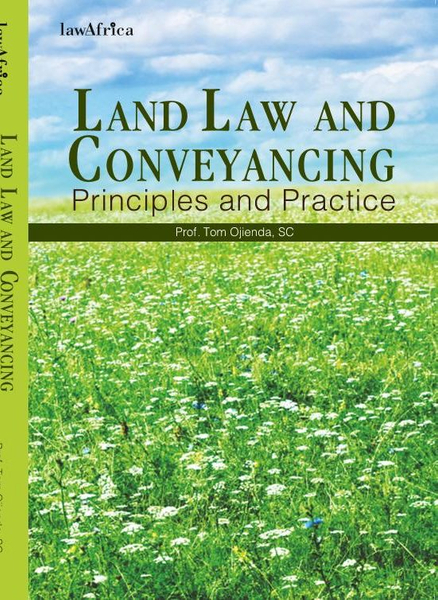
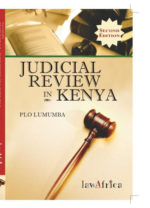
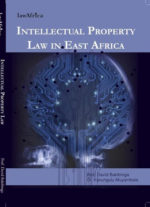


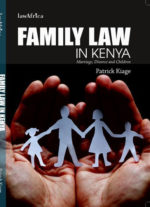
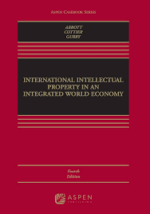


Be the first to review “Principles of Constitutional Law”